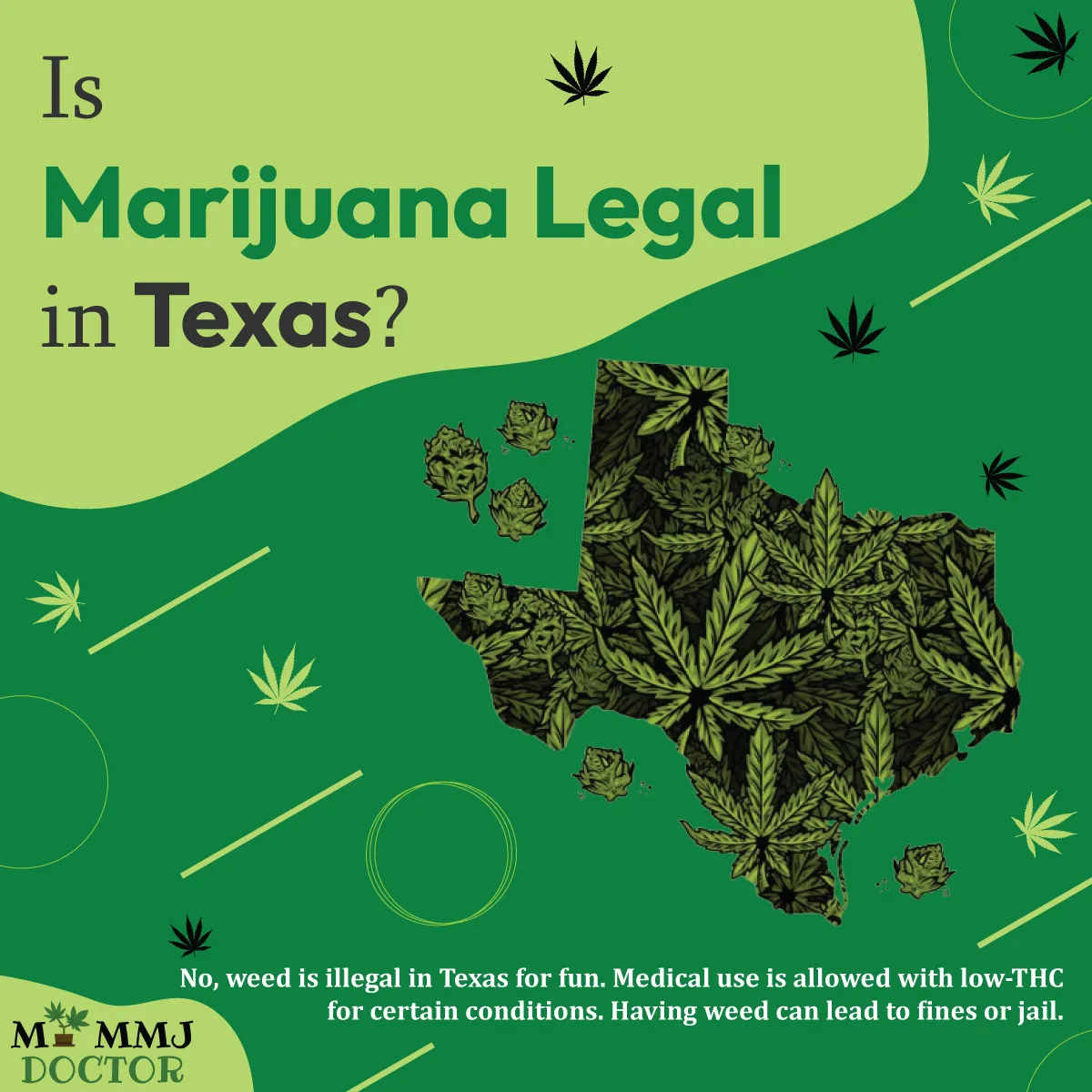
In Texas, medical marijuana is legal, but using it for recreational purposes is still not allowed. The state has very strict rules about medical marijuana, and only low-THC cannabis is permitted for medical use. To get medical marijuana, patients must meet certain conditions and go through a special program run by the state.
This program helps register patients who qualify for medical cannabis and ensures that they receive the right type and amount of marijuana for their health needs. Curious if weed is legal in Texas? Dive into the medical marijuana laws, discover penalties, and explore what’s permitted in the state.
Key Points:
- Medical Marijuana is Legal in Texas: Texas allows medical marijuana for specific conditions under the Compassionate Use Program.
- Texas Allows Limited Medical Marijuana Under Strict Conditions: Only low-THC products (0.3%) are permitted for approved medical conditions.
- Illegal Possession Will Lead to Severe Penalties: Possessing marijuana without authorization can result in fines, jail time, or both.
- Recreational Marijuana is Illegal in Texas: Using marijuana for non-medical purposes is strictly prohibited statewide.
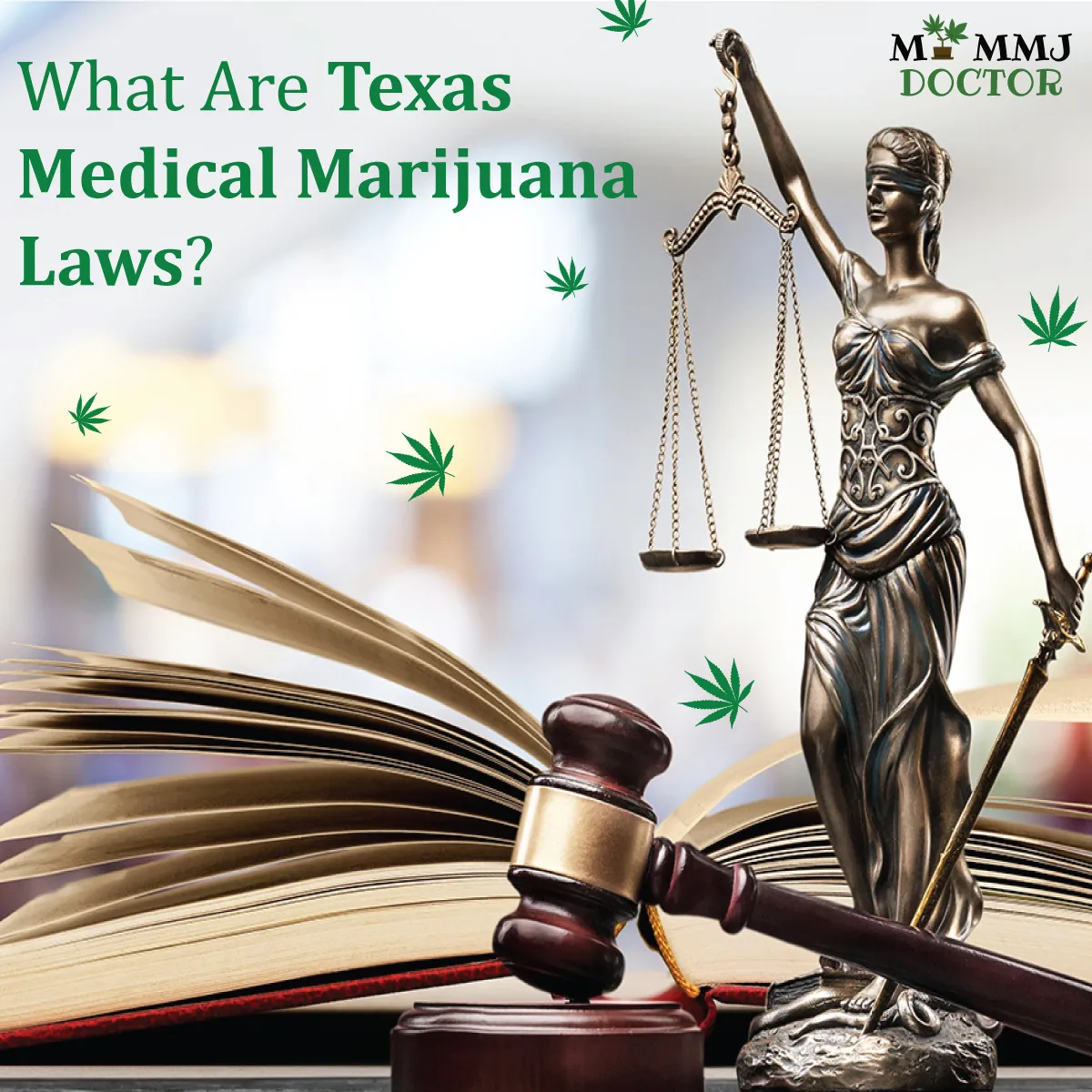
What are the laws on Medical Marijuana in Texas?
Here’s a breakdown of key legislative milestones that have shaped cannabis regulation in the state of Texas:
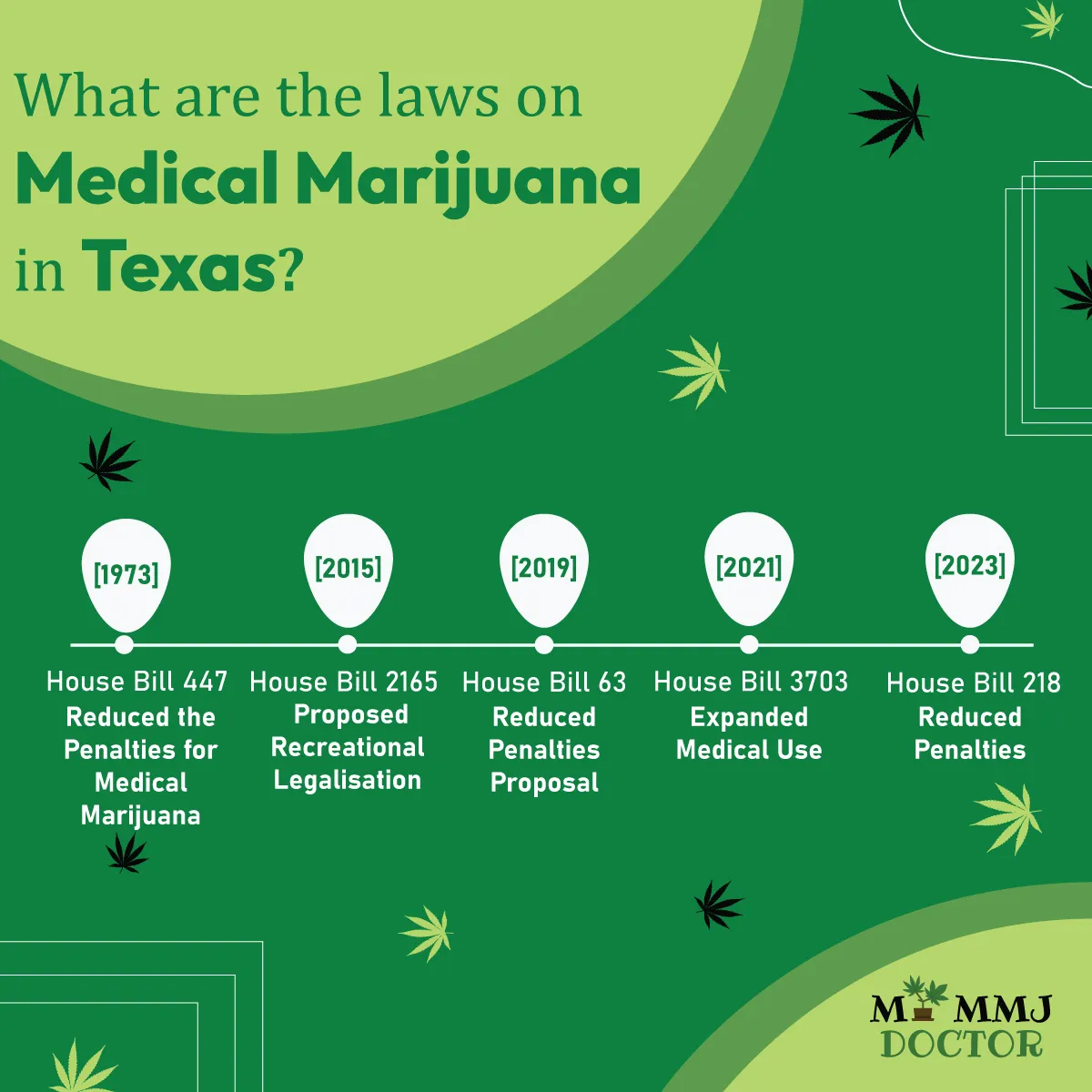
House Bill 447 (1973)- Reduced the Penalties for Medical Marijuana Possession
- Reduced penalties: Reduced possession of up to 2 ounces of cannabis to a Class B misdemeanor, punishable by a $1,000 fine and up to 180 days in jail.
- Historical context: Before this, Texas had the harshest cannabis laws, with possession of any amount being a felony.
- Impact: Allowed resentencing for those previously convicted, although the provision was later ruled unconstitutional. By 1974, 95 prisoners received clemency.
HB 2391 (2007)- The Cite and Release Law
- This law was named the cite and release law, allowing police to issue citations instead of making arrests for minor offenses, such as possessing up to four ounces of cannabis. However, despite this change, many police departments persisted in arresting individuals for these minor cannabis-related offenses.
HB (2015) – Proposed Recreational Legalisation
- Proposed by Rep. David Simpson, House Bill 2165 aimed to legalize recreational marijuana, gaining support in the House committee but ultimately failing to move forward due to time constraints.
SB 339 (2015) – The Texas Compassionate Use Act
- The Texas Compassionate Use Act, established under Senate Bill 339, allowed the use of low-THC cannabis oil (containing less than 0.5% THC) for the treatment of epilepsy. Gov. Greg Abbott signed the bill into law while maintaining his opposition to broader legalization.
HB63 (2019) – Reduced Penalties Proposal
- A proposal to change cannabis possession laws included House Bill 63, which aimed to reduce possession of up to one ounce to a minor offense. It would have eliminated jail time and lowered fines to $500.
HB 1325 (2019) – Hemp and Delta-8 THC Legalization
- The legalization of industrial hemp (containing less than 0.3% THC) and hemp-derived CBD products was enacted through House Bill 1325. However, it inadvertently allowed delta-8 THC, which later became the subject of legal disputes.
HB (2019, 2021) – Expanded Medical Use
- House Bill 3703 (2019) expanded the medical cannabis program by adding conditions such as cancer, autism, and ALS. Later, HB 1535 (2021) raised the THC limit for medical cannabis from 0.5% to 1% and also included PTSD and all forms of cancer in the qualifying conditions.
HB 218 (2023) – Reduced Penalties
What is the Texas Medical Marijuana Card?
In Texas, there’s no actual medical marijuana card like in other states. Instead, doctors use the Compassionate Use Registry of Texas (CURT) to prescribe medical marijuana for patients with certain qualifying health conditions. If you qualify, a doctor will evaluate you and add your prescription to this registry. Once it’s in the system, you can buy medical marijuana from licensed dispensaries. Just remember, Texas doesn’t accept medical marijuana cards from other states, and Texas prescriptions aren’t valid outside the state.
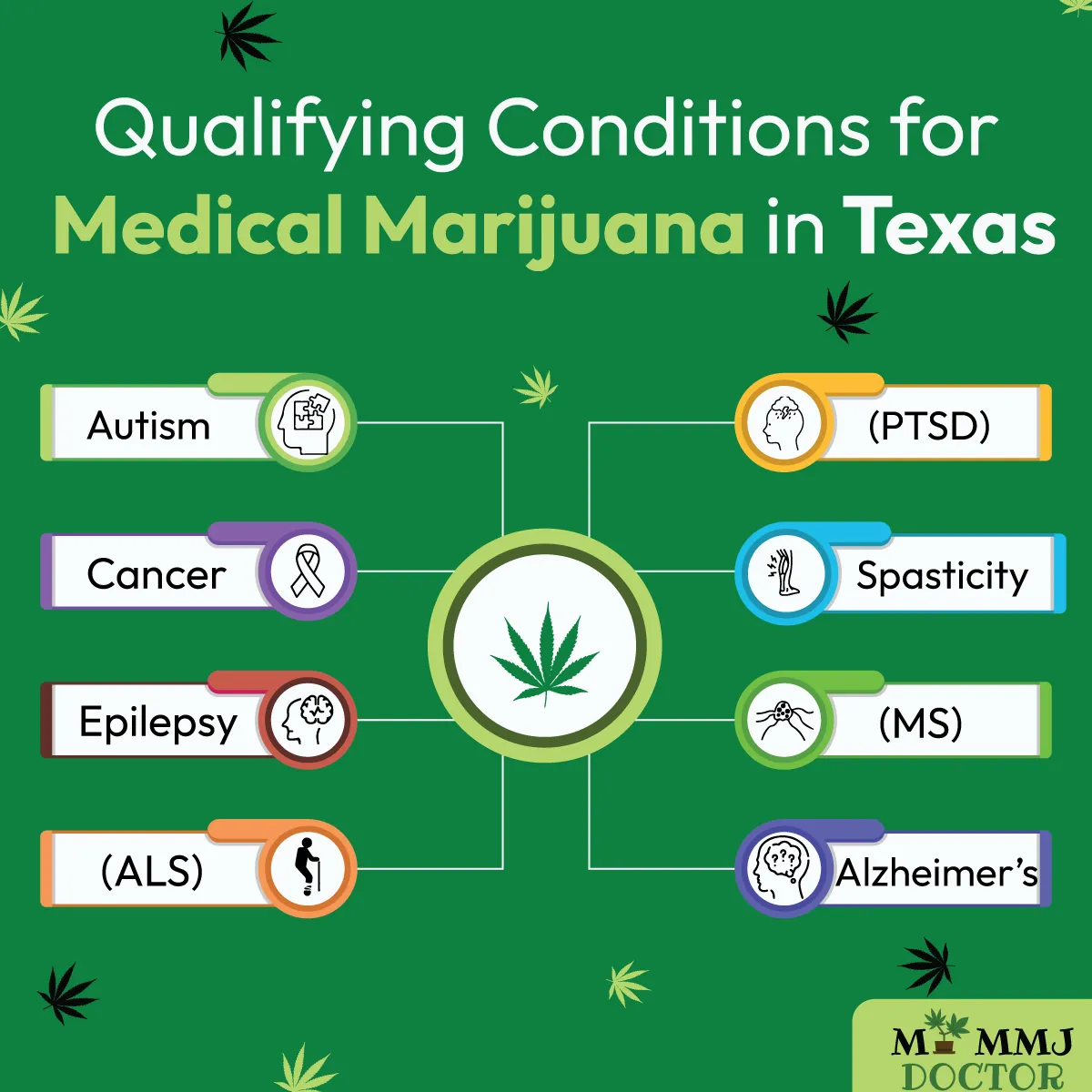
What are the qualifying conditions to get Medical Marijuana in Texas?
- Amyotrophic Lateral Sclerosis (ALS)
- Autism
- Cancer
- Epilepsy
- Huntington’s disease
- Incurable Neurodegenerative Diseases
- Multiple Sclerosis (MS)
- Muscular Dystrophy
- Post-Traumatic Stress Disorder (PTSD)
- Spasticity such as that caused by conditions like Parkinson’s Disease
These conditions are eligible under the Texas Compassionate Use Program (CUP), which allows patients who meet these criteria to receive medical cannabis.
Possession Limits:
| Amount Possessed | Classification | Penalty |
|---|---|---|
| 2 ounces or less | Class B Misdemeanor | Up to 180 days in jail and a fine of up to $2,000 |
| More than 2 oz but less than 4 oz | Class A Misdemeanor | Up to 1 year in jail and a fine of up to $4,000 |
| 4 oz to 5 pounds | Felony | 180 days to 2 years in prison and a fine of up to $10,000 |
| 5 to 50 pounds | Felony | 2 to 10 years in prison and a fine of up to $10,000 |
| 50 to 2,000 pounds | Second-Degree Felony | 2 to 20 years in prison and a fine of up to $10,000 |
| Over 2,000 pounds | First-Degree Felony | 5 to 99 years in prison and a fine of up to $50,000 |
Cultivation Limits:
- Cultivating marijuana in Texas is illegal, and it is classified as a felony.
- Penalties for cultivation: If caught growing marijuana, the penalty can range from 180 days in prison to life imprisonment, depending on the amount being cultivated.
- Penalties depend on the quantity of marijuana grown. Even growing small amounts of marijuana is considered a serious crime in Texas.
Note: The Compassionate Use Program allows for the medical use of low-THC cannabis for qualified patients, but cultivation for personal use is not permitted.
Which is the right place to take marijuana in Texas?
Private use only: You can consume medical marijuana in private settings, such as your home. It’s important to ensure that you’re not violating any homeowner association rules or landlord policies regarding cannabis use.
Where can you not consume Medical Marijuana in Texas?
There are certain public places like school and colleges, daycare centers, hospitals, public places like parks and museums etc.
What Form of Marijuana Can You Consume in Texas?
While smoking is restricted, other forms of medical marijuana, like edibles, oils, or tinctures, are legal to consume, as long as they follow the state’s guidelines.
How can My MMJ Doctor help with a Medical Marijuana Card in Texas?
- Get Your Recommendation Letter From My MMJ Doctor:
We will evaluate your condition after you consult with an approved Texas physician. If you qualify, we’ll email you a recommendation letter. This letter is essential for registering with the state’s medical marijuana program. - Register with the Texas Cannabis Control Program:
Use your recommendation letter to register on the Texas Cannabis Control Program website and create your Patient & Caregiver Registry profile. Ensure you have:- A government-issued ID
- Proof of Texas residency (alternative IDs are listed on the program’s website).
- Once registered, you’ll receive an email to activate your patient account. Verify your information, including:
- Name
- Date of birth
- Address
- Phone number
- Pay the Fee & Download Your Card:
After confirming your details, pay the registration fee to complete your application. Texas provides digital medical marijuana cards, which you can download using a link sent to your email.With your card, you can visit any licensed dispensary in Texas to purchase medical cannabis.

How can I become a Caregiver in Texas?
To become a caregiver in Texas, follow these steps:
Meet Basic Requirements:
- Be at least 18 years old.
- Have a high school diploma or GED.
Complete Required Training:
- Enroll in a state-approved training program.
- For Certified Nursing Assistants CNAs(Certified Nursing Assistant), complete a program with a minimum of 75 hours of training, including 24 clinical hours.
- For Home Health Aides HHAs(Home Health Aide), complete a program with a minimum of 75 hours of training, including 16 clinical hours.
Obtain Certification:
- Pass the competency exam to become a CNA.
- HHAs may need to pass a competency exam, depending on the employer’s requirements.
Gain Experience:
- Seek employment with home health agencies, nursing homes, or private homes.
Complete Continuing Education:
- Complete 12 hours of continuing education annually if working for a Medicare/Medicaid-certified home health agency.
Conclusion
In Texas, recreational cannabis is illegal, but medical marijuana is available for certain qualifying conditions through the Compassionate Use Program. The state permits low-THC cannabis for approved patients, and hemp-derived CBD products are allowed under specific regulations. The legality of Delta-8 THC remains uncertain, adding to the legal confusion.
If you’re looking to obtain medical marijuana or become a caregiver, it’s essential to follow Texas’ strict rules. My MMJ Doctor can help guide you through the process and ensure you provide a licensed healthcare practitioner.
FAQs
- Why is THC legal in Texas?
THC, or tetrahydrocannabinol, is legal in Texas in certain forms due to the state’s medical marijuana laws. In 2015, Texas passed the Compassionate Use Act, allowing patients with specific medical conditions (like epilepsy) to use low-THC cannabis oil. The law limits THC content to no more than 0.5%. However, recreational use of THC remains illegal in Texas, and laws around marijuana are still stricter compared to other states.
- Can I use CBD products legally in Texas?
Yes, CBD products with less than 0.3% THC are legal in Texas under state and federal law. You can buy them without a prescription at stores or online. These products are commonly used for wellness purposes and include items like oils, creams, gummies, and capsules. However, it’s important to check the THC content and ensure the product is properly labeled to comply with Texas regulations.
- Will Texas legalize marijuana in the next five years?
It’s uncertain whether Texas will legalize marijuana in the next five years. While there is increasing public support for legalization and ongoing discussions among lawmakers, Texas has historically taken a conservative approach to cannabis laws. Any changes would require approval from the state legislature and governor, making the timeline unpredictable. Keep an eye on legislative sessions for updates.
- Is Delta 8 and Delta 9 THC Legal in Texas?
CBD shops started selling delta-8 because its low THC levels made it a “legal marijuana extract” under House Bill 1325. However, in 2021, the Texas Department of State Health Services (DSHS) tried to ban its sale by classifying it as illegal. Meanwhile, In May 2022, the Ninth Circuit Court of Appeals ruled that delta-8 THC products are federally legal under the 2018 Farm Bill, provided their delta-9 THC content does not exceed 0.3% on a dry weight basis.
Related Articles
Benefits You Are Missing Without a Michigan MMJ Card
Top Benefits of a Michigan Medical Marijuana CardIf you live in Michigan and already use cannabis, you likely know it’s easy to access. However, many people don’t realize that having a Michigan medical marijuana (MMJ) card offers additional...
What are the Michigan Medical Marijuana Laws?
What are the Michigan Medical Marijuana Laws?Medical marijuana has been legal in Michigan since 2008, helping thousands of residents manage chronic pain, anxiety, cancer symptoms, and more. But knowing what’s allowed - and what’s not - can...
Is Weed Legal In Michigan?
Is Weed Legal In Michigan?Yes, it’s legal to use medical marijuana in Michigan. Since becoming the first state in the Midwest to legalize it in 2008, Michigan has refined its laws to ensure safe, accessible cannabis for patients. From growing...




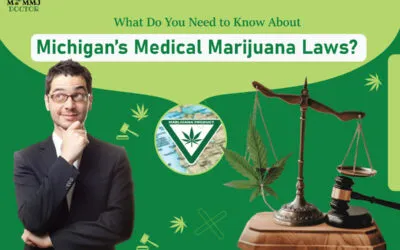
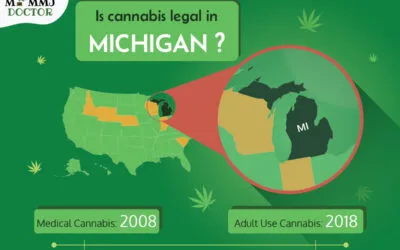
0 Comments